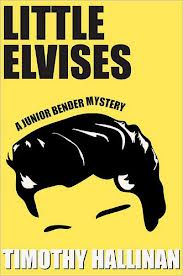Rock of Ages by Timothy Hallinan
 Monday, June 13, 2022 at 7:13AM
Monday, June 13, 2022 at 7:13AM 
Published by Soho Crime on June 14, 2022
Irwin Dressler is a big deal crime boss, but he’s getting old and younger lions are always looking for a chance to displace the leader. Dressler financed a tour of aging rock bands, a “mega tour of minor talent.” Four “old guys” drawn from the ranks of criminals who infiltrated the music world long ago (“killers, extortionists, leg-breakers, kidnappers, armed robbers, and threat specialists”) are enjoying the fun of touring with the bands, but Dressler thinks they are also skimming profits, if not outright stealing bags of money. He asks Junior Bender to investigate. Junior isn’t in a position to say no to Dressler. Nobody says no to Dressler.
Fans of the series will know that Bender is a divorced burglar who has been trying to keep the truth of his occupation from his teenage daughter. Keeping information from teenage girls is a lost cause, as Bender discovers when he brings Rina to the concert whose promoters he is investigating.
Rock of Ages isn’t a typical Junior Bender novel. Bender commits no burglaries, but he uses his criminal skills in a variety of ways. Early in the novel, a heavy backdrop falls, putting an end to an annoying long drum solo — and the drummer. Bender notes that the ropes holding the backdrop in place had been cut and suspects that the drummer was not the intended victim. For that reason, Rock of Ages has some elements of a whodunit, with Bender playing the role of a detective. Bender spends much of the novel sneaking around (a task that makes use of his burglary skills) to figure out what’s likely to happen to the tour profits and who orchestrated the backdrop’s fall.
Timothy Hallinan establishes a convincing atmosphere with the sights, sounds, and smells of an older theater. This is a relatively nonviolent crime novel, with just enough gunplay and torture to remind the reader that it is a crime novel, but not so much that violence becomes the point of the story. Bender’s uncertainty about the degree to which he should reveal his life to his daughter exemplifies the characterization that is one of Hallinan’s strengths. Populating novels with colorful background characters is another. The aging rock musicians display the different traits that should be expected of rock musicians (vanity, jealousy, addiction). The best collateral character is an aging groupie who instantly bonds with Rina.
Hallinan describes a man as being in “his carnivorous middle-fifties and as thin as an abandoned hope.” Hallinan’s ability to drop a few incredible sentences into his books is one of the reasons I look forward to his novels. While Rock of Ages is not my favorite Junior Bender novel — the plot is secondary to the amusing characters — I appreciated the novel for other reasons, including its memorable images of aging rock bands playing in small venues at the end of their careers.
RECOMMENDED



